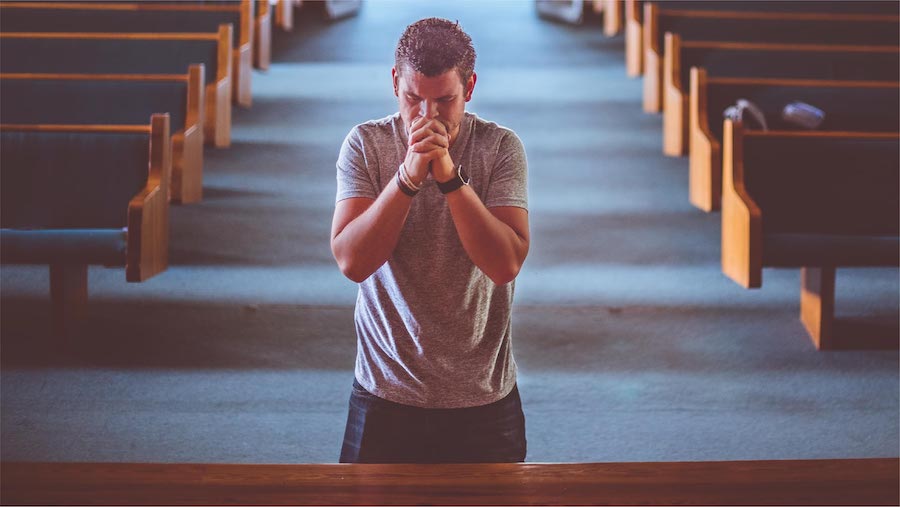The True Meaning of Repentance | Jonah

By Rev. Jeremiah Cheung
From Jonah 3:1-10
3:1 Then the word of the Lord came to Jonah a second time: 2 “Go to the great city of Nineveh and proclaim to it the message I give you.”
3 Jonah obeyed the word of the Lord and went to Nineveh. Now Nineveh was a very large city; it took three days to go through it. 4 Jonah began by going a day’s journey into the city, proclaiming, “Forty more days and Nineveh will be overthrown.” 5 The Ninevites believed God. A fast was proclaimed, and all of them, from the greatest to the least, put on sackcloth.
6 When Jonah’s warning reached the king of Nineveh, he rose from his throne, took off his royal robes, covered himself with sackcloth and sat down in the dust. 7 This is the proclamation he issued in Nineveh:
“By the decree of the king and his nobles: Do not let people or animals, herds or flocks, taste anything; do not let them eat or drink. 8 But let people and animals be covered with sackcloth. Let everyone call urgently on God. Let them give up their evil ways and their violence. 9 Who knows? God may yet relent and with compassion turn from his fierce anger so that we will not perish.”
10 When God saw what they did and how they turned from their evil ways, he relented and did not bring on them the destruction he had threatened.
What is repentance? The city of Nineveh is the best example of repentance. The Lord forgave them because of their repentance. Their repentance was genuine and acceptable to the Lord. Let us learn the true meaning of repentance from this chapter:
- Repentance means to turn around. The Lord asked Jonah to go to Nineveh, but instead, he went to Joppa because he wanted to board a ship and flee to Tarshish. Geographically, these two places were in opposite directions; one was located to the northeast while the other was in the west. However, in Chapter 3, Jonah turned back. Isn’t that what repentance is — a changing of direction? Repentance means to make a U-turn. This is the first meaning of repentance, turning back from our sins and mistakes.
- Repentance is stepping down from the throne. When news about the city’s impending destruction reached the king, he got off his throne, took off his garments, put on sackcloth, and sat down in the dust. The king stepped down from the highest position to the lowest position – is this not the best manifestation of humble repentance?
- Repentance is a change in behavior. The king commanded everyone to turn around and give up their evil ways and their violence and the people of Nineveh obeyed. True repentance takes place not only in the heart but also in one’s actions. Not only does a person give up his sins, but he will seek to obey God’s will — a true indication of repentance.
When these people repented, God relented and did not bring on the destruction He had threatened. God is not human that He would change His mind, this is what the Bible says; therefore, we cannot liken God changing his mind to humans regretting and changing their minds. We regret mainly because we made mistakes or judged erroneously, but once we realize our error, we regret it or change our minds. On the contrary, God does not make mistakes. He does not make mistakes in His judgments and plans because He is an all-knowing and almighty God. God relenting or changing His mind is based on God’s faithfulness and God’s justice. The righteous God rewards good and punishes evil. Good must be rewarded and evil must be punished.
When a person truly repents, the Lord will — based on His faithfulness and justice — relent and withdraw the foretold disaster. Yet in God’s final judgment, evil will meet retribution and good will be rewarded. Let us not tarry; instead, let us repent quickly.
Previous Post: Prayer Inside the Belly of a Fish
悔改的真義 | 約拿書
張國強牧師
約拿書 3:1-10
3:1 耶和華的話, 二次臨到約拿說, 2 你起來, 往尼尼微大城去, 向其中的居民宣告我所吩咐你的話。
3 約拿便照耶和華的話起來, 往尼尼微去。這尼尼微是極大的城, 有三日的路程。4 約拿進城走了一日, 宣告說: 再等四十日, 尼尼微必傾覆了。5 尼尼微人信服神, 便宣告禁食, 從最大的到至小的都穿麻衣。
6 這信息傳到尼尼微王的耳中, 他就下了寶座, 脫下朝服, 披上麻布, 坐在灰中。7 他又使人遍告尼尼微通城說: 王和大臣有令, 人不可嘗甚麼, 牲畜, 牛羊, 不可喫草,也不可喝水。8 人與牲畜都當披上麻布, 人要切切求告神, 各人回頭離開所行的惡道, 丟棄手中的強暴。9 或者神轉意後悔, 不發烈怒, 使我們不至滅亡, 也未可知。
10 於是神察看他們的行為, 見他們離開惡道, 他就後悔, 不把所說的災禍降與他們了。
什麼叫悔改? 尼尼微城大城是最好的例子, 神也因為他們的悔改赦免了他們的罪, 可見他們的悔改是真實的, 是蒙神悅納的, 我們就從這章經文來看悔改真正的意思:
- 從約拿身上看見悔改是方向的回轉。神要約拿去尼尼微, 但他卻去了約帕, 因為他要坐船往他施去。從地理上來看, 這是兩個完全相反的方向, 一個在東北, 一個在西; 但在第三章約拿轉回來了, 悔改不就是改變方向嗎?悔改的意思就是U-turn. 我們要從錯誤的方向轉回, 這是悔改第一個意思。
- 從尼尼王身上看見悔改是從寶座下來。當全城四十日後要滅亡的消息傳到王的耳中, 他竟然從寶座上下來, 甚至脫下朝服, 披上麻布, 坐在灰中。從最高的位置降到最低的地位, 這不就是悔改最好的解釋嗎? 這叫謙卑認罪。
- 從尼尼微百姓身上看見悔改是行為的改變。王下命令說: 各人回頭離開所行的惡道, 丟棄手中的強暴。真正的悔改不單在心裡, 也有行動的表示。不單離罪更要遵行神的旨意, 這才是悔改真正的表現。
當他們悔改後, 神就後悔不降災了。神不是人, 神不會後悔的, 這是聖經的教導; 所以我們不能用人的後悔來解釋神的後悔。人的後悔主要是因為作錯了, 想錯了, 後來知道了, 所以後悔了。但神不是作錯, 不會想錯的, 因為祂是全知全能的神。
神的後悔是基於神的信實, 神的公義。公義的神是賞善罰惡的, 善一定要賞賜, 惡一定要罰。當人真正的悔改, 基於神的信實與公義, 祂會改變他的心意, 將災禍拿下, 但在神最終的審判裡, 惡必定會有報應, 善也一定會有賞賜。我們要快快悔改, 不要遲延。
